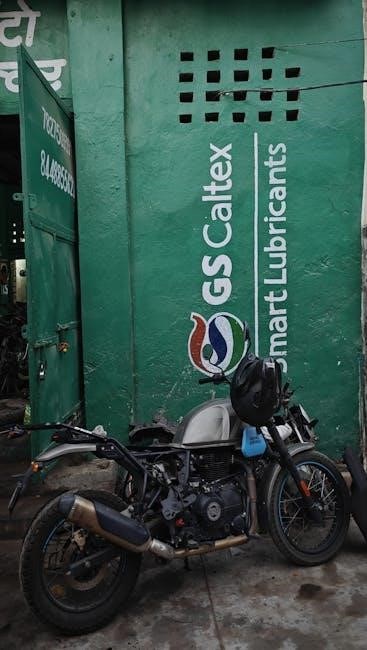The Vehicle Repair, Services and Retail Award 2023 provides essential guidelines for employers and employees in the automotive industry, ensuring fair pay and compliance․
1․1 Overview of the Vehicle Repair Services and Retail Award 2023
The Vehicle Repair Services and Retail Award 2023 outlines pay rates and conditions for employees in vehicle repair, services, and retail sectors․ Effective from 1 July 2023, it covers minimum wages, allowances, penalties, and overtime․ Employers must comply to ensure fair compensation․ The Award, published by the Fair Work Ombudsman, provides clarity on classifications, entitlements, and compliance requirements, ensuring up-to-date standards in the industry․
1․2 Importance of Understanding the Pay Guide
Understanding the Vehicle Repair Services and Retail Award 2023 Pay Guide is crucial for employers and employees to ensure compliance with Fair Work standards․ It provides clarity on minimum wages, allowances, and penalties, helping employers avoid legal issues․ Employees benefit by knowing their entitlements, ensuring fair compensation․ Staying informed about updates, especially amid inflation and rising industry costs, is essential for maintaining workplace fairness and financial stability․
What is the Vehicle Repair, Services and Retail Award?
The Vehicle Repair, Services, and Retail Award is an industrial instrument governing minimum wages, conditions, and entitlements for employers and employees in the automotive sector․
2․1 Definition and Scope
The Vehicle Repair, Services, and Retail Award defines the scope of coverage for businesses engaged in vehicle repairs, services, and retail activities․ It outlines the minimum entitlements for employees, including wages, allowances, and penalties, ensuring fair compensation across the industry․ The award applies to employers and employees in automotive repair shops, dealerships, and related retail sectors, excluding certain activities like car parking and motor vehicle rentals unrelated to repairs․
2․2 Who is Covered by the Award
The Vehicle Repair, Services, and Retail Award covers employers and employees in the automotive repair, service, and retail sectors․ It applies to businesses engaged in vehicle repairs, maintenance, and related retail activities․ Employees, including mechanics, technicians, and sales staff, are entitled to the award’s provisions․ However, it excludes certain industries like car parking and motor vehicle rentals unless they are directly connected to repair or service activities․ The award ensures fair compensation and compliance for all covered parties․
Key Changes in the 2023 Pay Guide
The 2023 Pay Guide introduces updated minimum wage rates, adjustments to allowances and penalties, and revised overtime rules to reflect current industry standards and economic conditions․
3․1 Updates to Minimum Wage Rates
The 2023 Pay Guide includes significant increases in minimum wage rates for all classification levels under the Vehicle Repair, Services and Retail Award․ These changes aim to align wages with rising inflation and living costs, ensuring fair compensation for employees․ The updated rates apply from the first full pay period on or after 1 July 2023, affecting both weekly and hourly pay structures across the automotive industry․
3․2 Adjustments to Allowances and Penalties
The 2023 Pay Guide introduces adjustments to allowances and penalties, reflecting industry needs and cost-of-living changes․ Overtime penalties, shiftwork loadings, and specific allowances for roles like first aid officers and leading hands have been updated․ These changes ensure fair compensation for employees and clarity for employers, effective from the first full pay period on or after 1 July 2023․
Minimum Wage Rates for 2023
The 2023 pay guide outlines minimum wage rates effective from the first full pay period on or after 1 July 2023, based on classification levels․ Rates start at $859․30 weekly or $22․61 hourly for Level 1, ensuring fair compensation across the vehicle repair and retail sector․
4․1 Classification Levels and Corresponding Pay Rates
The Vehicle Repair, Services and Retail Award 2023 outlines specific pay rates for different classification levels․ Level 1 employees earn $859․30 weekly or $22․61 hourly, while Level 2 employees receive $882․80 weekly or $23․23 hourly․ Casual rates include a 25% loading, ensuring fair compensation across all employment types․ These rates are effective from the first full pay period on or after 1 July 2023, providing clarity for employers and employees alike․
4․2 Weekly and Hourly Rate Breakdown
The Vehicle Repair, Services and Retail Award 2023 details specific weekly and hourly pay rates․ For example, Level 1 employees earn $859․30 per week or $22․61 per hour, while Level 2 employees receive $882․80 per week or $23․23 per hour․ These rates are effective from the first full pay period on or after 1 July 2023․ The breakdown ensures transparency and clarity for both employers and employees, facilitating accurate payroll management and compliance․
4․3 Casual Loadings and Penalty Rates
The 2023 pay guide outlines casual loadings and penalty rates for employees in the vehicle repair and retail sector․ Casual employees receive a 25% loading on their base rates․ Penalty rates apply for work on weekends, with 150% of the base rate for Saturdays and 200% for Sundays․ Public holiday penalties are also detailed, ensuring fair compensation for all working arrangements․ These rates are effective from the first full pay period on or after 1 July 2023․

Overtime and Penalty Rates
Overtime payments are set at 150% of the base rate for the first two hours and 200% thereafter․ Penalty rates apply for weekend shifts and public holidays, ensuring fair compensation․
5․1 Overtime Pay Calculations
Overtime pay is calculated at 150% of the base rate for the first two hours worked beyond the standard 38-hour week․ For any additional hours, the rate increases to 200%․ Shiftwork penalties also apply, with higher rates for work performed on weekends or public holidays, ensuring fair compensation for employees working outside standard hours․
5․2 Shiftwork Penalties and Loadings
Shiftwork penalties apply to employees working outside standard hours, with specific loadings for different shifts․ Early morning shifts attract a 10% increase, while afternoon shifts receive a 15% loading․ Night shifts are penalized at 25% above base rates․ Casual employees receive an additional 25% loading on top of these penalties, ensuring fair compensation for non-standard working hours․

Allowances and Loadings
The 2023 pay guide outlines specific allowances for tools, meals, and travel, with loadings applied to shiftwork and casual rates, as detailed in the award․
6․1 Types of Allowances Covered
The Vehicle Repair, Services and Retail Award 2023 includes allowances for tools, meals, and travel, ensuring employees are compensated for work-related expenses․ These allowances are specifically detailed in the award to reflect industry standards and employee needs․
6․2 How Loadings are Applied
Loadings are additional payments applied to base rates for specific work conditions․ Casual loadings are added to compensate for benefits like leave, while penalty rates apply for overtime, weekends, or shiftwork․ These loadings ensure fair compensation for varying work demands, as outlined in the Vehicle Repair, Services and Retail Award 2023․
Industry Overview and Statistics
The vehicle repair and retail sector shows steady growth, with employment numbers reflecting industry stability․ Inflation impacts repair costs, influencing pricing and wage structures in 2023․
7;1 Growth Trends in the Vehicle Repair and Retail Sector
The vehicle repair and retail sector is experiencing steady growth, driven by increasing vehicle complexity and technological advancements․ Rising demand for specialized services, such as electric vehicle maintenance, is boosting the industry․ Additionally, shifting consumer preferences toward vehicle longevity and regular servicing are contributing to sector expansion․ The after-sales market, including parts and accessories, is also thriving, further supporting industry growth in 2023․
7․2 Employment Numbers and Key Statistics
The vehicle repair and retail sector employs approximately 400,000 individuals across Australia, spanning roles from mechanics to sales staff․ The industry has seen a steady increase in employment, with a projected annual growth rate of 2-3%․ Key statistics highlight a median weekly earnings figure of around $1,200, reflecting the sector’s contribution to the economy․ These numbers underscore the industry’s stability and its role in supporting workforce demand in 2023;
Impact of the 2023 Pay Guide on Employers
The 2023 Pay Guide introduces updated wage rates, allowances, and penalties, directly impacting employers’ payroll costs․ Compliance with these changes is essential to avoid legal repercussions and ensure fairness․
8․1 Compliance Requirements for Businesses
Employers must adhere to the 2023 Pay Guide by updating payroll systems to reflect new wage rates, allowances, and penalties․ Accurate record-keeping is essential to ensure compliance․ Businesses must also communicate changes to employees and display relevant information prominently․ Failure to comply may result in legal action from the Fair Work Ombudsman․ Regular audits and consultations with payroll professionals are recommended to maintain adherence and avoid penalties․
8․2 Managing Payroll and Record-Keeping
Accurate payroll management is crucial for compliance with the 2023 Pay Guide․ Employers must maintain detailed records of wages, allowances, and overtime paid․ Regular audits ensure transparency and correctness․ Utilizing payroll software can streamline processes and reduce errors․ Clear communication with employees about their pay structure is essential․ Employers should also retain records for at least seven years, as required by law․ Digital solutions can enhance efficiency and ensure adherence to regulatory standards․
Employee Entitlements and Benefits
Employees covered by the 2023 Pay Guide are entitled to minimum wages, allowances, and overtime pay․ Benefits include job security, fair compensation, and clear payment terms․
9․1 Understanding Your Pay Structure
Understanding your pay structure under the 2023 Vehicle Repair, Services and Retail Award ensures clarity on wages, overtime, and allowances․ Employees should review their payslips to verify compliance with minimum rates and entitlements․ The pay structure outlines classifications, hourly rates, and casual loadings, providing transparency for fair compensation․ Checking the pay guide regularly helps employees confirm their payments align with the award’s specifications and industry standards․
9․2 Additional Benefits and Allowances
Beyond base pay, the 2023 Vehicle Repair, Services and Retail Award includes allowances for specific work conditions․ These may cover tools, uniforms, and travel expenses․ Penalty rates apply for evening, weekend, or public holiday work, ensuring fair compensation for less desirable shifts․ Employers must provide detailed breakdowns of these benefits in payslips to maintain transparency and compliance with the award’s provisions․
How the Pay Guide Affects Vehicle Repair and Retail Businesses
The 2023 Pay Guide impacts businesses by increasing labor costs due to updated wage rates and allowances, requiring budget adjustments and strategic pricing to maintain profitability and competitiveness․
10․1 Cost Implications for Employers
The 2023 Pay Guide introduces updated wage rates, allowances, and penalty adjustments, increasing labor expenses for employers․ Businesses must adapt by reviewing budgets and pricing strategies to absorb these costs without compromising profitability․ Small businesses, in particular, may face tighter profit margins due to the rise in minimum wages and loadings, effective from the first pay period after 1 July 2023․
10․2 Strategies for Maintaining Competitiveness
To stay competitive, employers can invest in workforce efficiency, adopt cost-saving technologies, and enhance customer service․ Upskilling employees and optimizing workflows can reduce labor costs․ Offering flexible pricing models or loyalty programs can attract customers․ Leveraging data analytics for better inventory management and pricing strategies also supports profitability․ Employers should stay informed about industry trends and best practices to navigate the evolving landscape effectively․

The Role of the Fair Work Ombudsman
The Fair Work Ombudsman ensures compliance with the Vehicle Repair, Services and Retail Award, provides resources, and assists employers and employees with disputes and education․
11․1 Ensuring Compliance with the Award
The Fair Work Ombudsman ensures compliance with the Vehicle Repair, Services and Retail Award by conducting audits and investigations to verify adherence to pay rates, allowances, and conditions․ They provide guidance and resources to help employers understand their obligations and assist employees in resolving disputes․ Through education and enforcement, they promote fair workplace practices and ensure that all parties comply with the Award’s provisions․ Their efforts ensure a fair and compliant work environment, benefiting both businesses and workers in the vehicle repair and retail sector․
11․2 Resources for Employers and Employees
The Fair Work Ombudsman offers comprehensive resources, including pay guides, fact sheets, and online tools, to help employers and employees understand the Vehicle Repair, Services and Retail Award․ These resources cover minimum wages, allowances, and penalty rates, ensuring clarity and accessibility․ Employers can access templates for payroll management, while employees can find information on their entitlements and dispute resolution processes, fostering a well-informed and compliant workplace environment for all parties involved in the vehicle repair and retail sector․

Inflation and Its Impact on Vehicle Repair Costs
Inflation has led to rising costs of materials and labor in the vehicle repair sector, prompting businesses to adjust pricing and operations to maintain profitability and compliance with the 2023 pay guide․
12․1 Rising Costs of Materials and Labor
Inflation has significantly increased the costs of materials and labor in the vehicle repair sector, impacting businesses’ profitability․ The 2023 pay guide reflects these changes, with updated minimum wage rates and allowances to address rising expenses․ Supply chain disruptions and higher demand for skilled labor have further driven up costs, prompting employers to adjust pricing strategies to maintain financial stability while complying with the Vehicle Repair, Services and Retail Award requirements․
12․2 How Businesses Are Adjusting to Inflation
Businesses in the vehicle repair sector are implementing strategies to counter inflation, such as increasing service prices and optimizing supply chains․ Some employers are investing in technology to enhance efficiency, while others are focusing on staff training to improve productivity․ The 2023 pay guide supports these adjustments by providing clear guidelines on wage rates and allowances, helping businesses maintain competitiveness without compromising compliance with the Vehicle Repair, Services and Retail Award standards․

Expert Advice for Navigating the 2023 Pay Guide
Consult industry professionals to ensure compliance with the Vehicle Repair, Services and Retail Award 2023․ Regularly audit payroll systems and stay updated on inflation-related adjustments to maintain competitiveness and fairness in employee compensation․
13․1 Best Practices for Employers
Employers should regularly review the Vehicle Repair, Services and Retail Award 2023 to ensure compliance with updated pay rates and conditions․ Conduct payroll audits to verify accuracy and maintain detailed records․ Stay informed about inflation adjustments and their impact on labor costs․ Invest in employee training to enhance productivity and consider implementing flexible scheduling to attract and retain skilled workers in a competitive market․
13․2 Tips for Employees to Maximize Their Entitlements
Employees should familiarize themselves with the Vehicle Repair, Services and Retail Award 2023 to understand their pay rates and conditions․ Regularly review pay slips to ensure accuracy and inquire about any discrepancies․ Keep records of working hours, especially for overtime and shiftwork, to verify entitlements․ Stay updated on allowance and penalty rate changes, and seek advice from the Fair Work Ombudsman if needed to ensure they receive all due benefits․
The Vehicle Repair, Services and Retail Award 2023 Pay Guide is crucial for compliance, outlining key entitlements and supporting employers and employees in maintaining fair practices and industry growth․
14․1 Summary of Key Takeaways
The Vehicle Repair, Services and Retail Award 2023 Pay Guide outlines updated minimum wages, allowances, and penalty rates, effective from 1 July 2023․ It ensures fair compensation for employees and compliance for employers․ Key takeaways include classification-based pay rates, overtime calculations, and inflation adjustments․ Employers must adhere to these standards to maintain competitiveness and avoid penalties․ The guide also emphasizes the Fair Work Ombudsman’s role in enforcing compliance and providing resources for both parties․
14․2 Future Outlook for the Vehicle Repair and Retail Industry
The vehicle repair and retail industry is expected to evolve with technological advancements and rising demand for sustainable practices․ Businesses must adapt to changing consumer preferences and regulatory requirements․ The 2023 Pay Guide underscores the importance of fair wages and compliance, ensuring the industry remains competitive․ As inflation stabilizes, employers will focus on efficient operations and workforce development to maintain growth and meet future challenges effectively․
